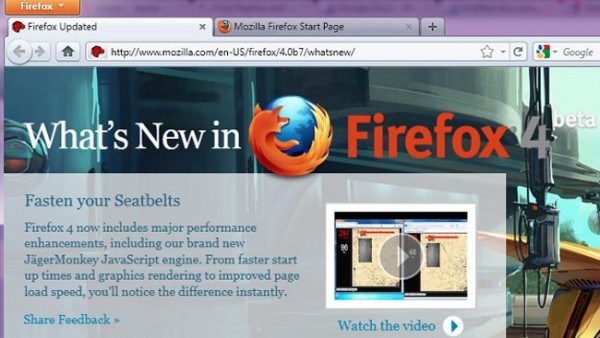
Firefox 4 Beta 7 may indicate that Mozilla will return as among the fastest browser. Some tests reveal that the new beta version is about 3 times faster than the latest stable version of Firefox when rendering JavaScript, and only slightly behind Opera. It includes all features slated for the final, stable version in 2011. The Beta 7 includes the new JavaScript Just In Time (JIT) compiler, also known as “JagerMonkey,” which significantly improves the browser’s raw performance. In general, Opera 11 Alpha tends to lead the race barely edges the Firefox 4 Beta 7, while the Google’s Chrome 8 Beta is on the 3rd position.
Meanwhile, results for Internet Explorer 9 Beta and Apple’s Safari put both considerably behind the top three. The Firefox 4 Beta 7 is roughly 25% faster than Internet Explorer 9 Beta in most tests. When tested against Microsoft’s current browser Internet Explorer 8, Firefox 4 Beta 7 is 12 times faster in JavaScript rendering. Generally, Mozilla boasted the significant performance boosts courtesy of the new JagerMonkey compiler. Mozilla’s blog tells us to “fasten our seatbelts,” by showing Javascript tests with tests with SunSpider, Google’s V8 and Kraken.
In a few tests, Firefox 4 Beta 7 is approximately three times faster than the current Firefox 3.6.12. (Mozilla claimed that Google V8’s results indicated that Firefox 3.6.12 was five times slower than Firefox 4 Beta 7) The Firefox 4 in Beta 7 supports hardware acceleration (in both Mac OS X and Windows), OpenType font format and WebGL 3D graphics standard.
Mozilla will also offer now acceleration aspects of page composition and content rendering when running in Windows OSs and also in Mac OS X. Browser hardware acceleration feature makes it possible to shift some tasks from the CPU to the GPU to distribute load and boost performance, particularly for graphics-intensive tasks like rendering video or complicated three-dimensional objects. If Microsoft offers hardware acceleration with Internet Explorer 9, which relies heavily on the Direct3D API to boost page composition in Windows environment, Mozilla, however, moves one step further by accelerating page composition. Microsoft’s IE9 is not supported in Windows XP due to the lack of support Direct2D, which is needed to boost content rendering.
The Mac version of Firefox 4 Beta 7 uses the popular cross-platform OpenGL for page composition acceleration. Firefox 4 does not support hardware acceleration in Linux due to unresolved driver issues. Mozilla’s next step is to identify bugs and wait for the JagerMonkey integration into the JavaScript engine. It is expected that the stable version of Firefox 4 will be available in early 2011. However, Mozilla’s schedule remains aggressive; you should expect to see three more betas before 2011.










Comments